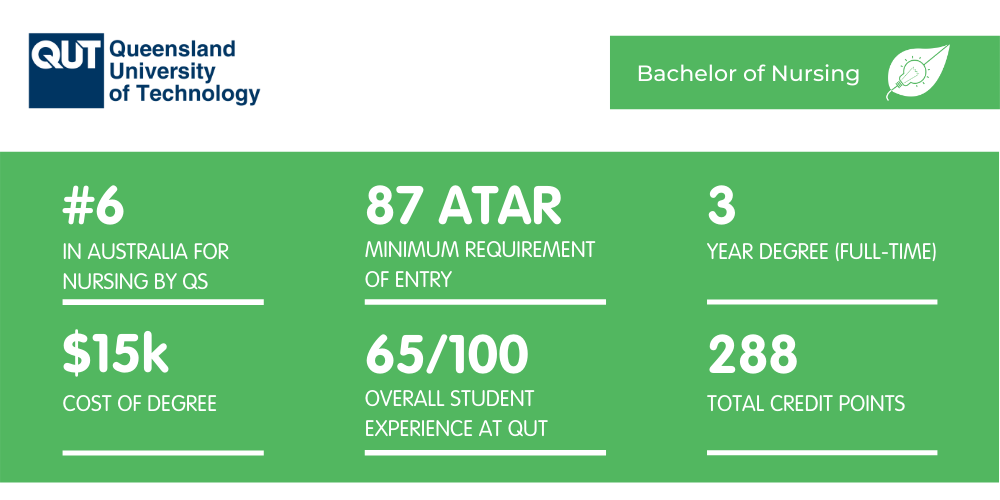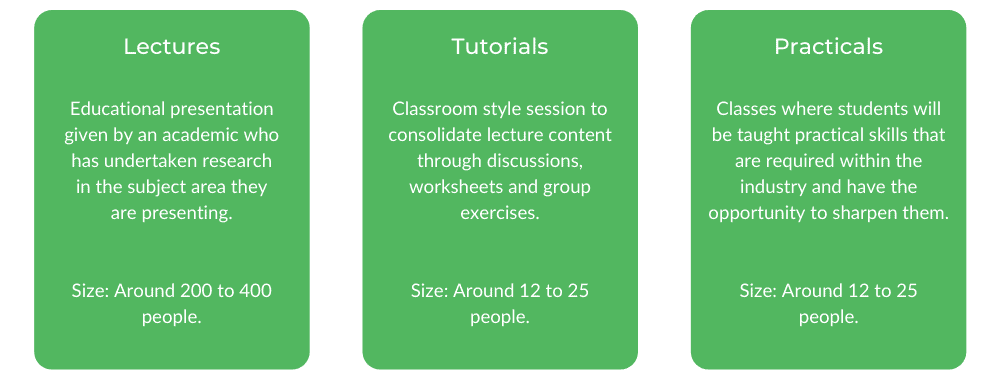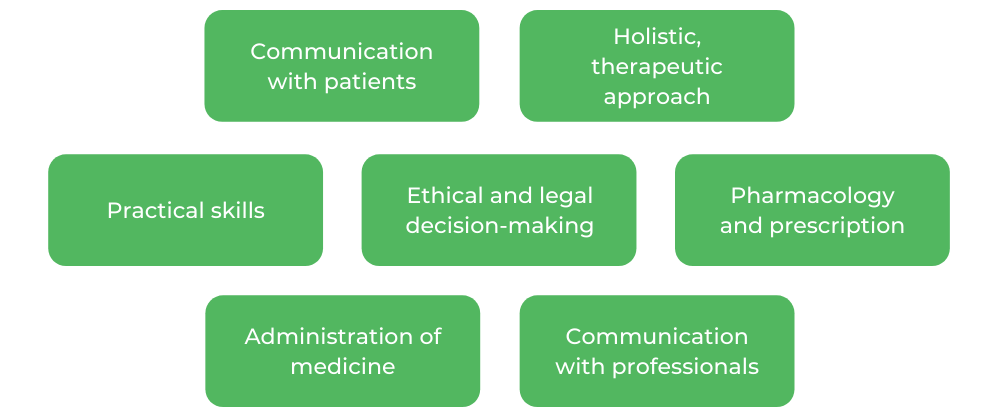So you’re interested in a Bachelor of Nursing at QUT, but want a taste of what it’s like?
This article will detail what the degree consists of, including core subjects, career paths, and teaching format, as well as an inside perspective on university culture, life, and what to expect.
Let’s dive right in!
What is a Bachelor of Nursing at QUT?
Core Units for this Degree
How to Get into a Bachelor of Nursing at QUT
What’s the Teaching Format?
What’s the Faculty and Culture Like?
What is a Bachelor of Nursing at QUT?
A Bachelor of Nursing at QUT is a hands-on, immersive 3-year course that provides students with up-to-date knowledge based on emerging developments in healthcare and nursing practice.
This degree will provide you with the foundational health and nursing skills as well as real-world nursing experience to best equip you for a professional career.
It is also very common to supplement your nursing degree with a second QUT degree, such as Behavioural Science (Psychology), or Public Health.
What can you expect from studying a Bachelor of Nursing?
Studying a Bachelor of Nursing at QUT, you can expect realistic learning experiences! This includes QUT’s valuable ‘fake wards’ to simulate a real hospital environment.
These offer students the opportunity to partake in practical work from first year, including the use of manikins as patients.
In addition, the workload for a Bachelor of Nursing at QUT can be intense yet not too difficult, so time management is key!
Career Paths
Some of the career paths a Bachelor of Nursing equips you for include:
- Registered Nurse
- Chemo Nurse
- Theatre Nurse
- Cardiac Nurse
- Critical Care Nurse
- ER Nurse
- Nurse Educator
A Bachelor of Nursing at QUT is quite directly catered towards a nursing career. However, there are opportunities to specialise or build upon your Bachelor of Nursing.
This often includes becoming a doctor with further study (i.e. a Doctorate), as well as other fields such as nurse education.
Once you are a registered nurse, you may also specialise in a certain area and thus ‘ascend the food chain’, for example becoming a theatre nurse, or chemo nurse. Certain kinds of nurses, such as a Mental Health Nurse or a Certified Registered Nurse Anaesthetist (CRNA) may require extra qualifications such as a masters degree.
However, the scope of practice once you’re in the field is surprisingly wide!
Core Units for this Degree
What are the Core Units?
All nursing students must partake in certain foundational nursing units as well as practical units to complete their degree.
First Year
In first year, this includes fundamentals of nursing; fundamentals cover basic anatomy, pharmacology, clinical reasoning and team-work skills. For example, you will develop an understanding of the structure (anatomy) and functions (physiology) of the human body in health care environments through subjects like ‘Anatomy and Physiology for Health Professionals’.
Further, you will learn how to execute “person-centred care” to effectively treat people from all backgrounds and needs, in ‘Professional Practice and Cultural Safety’.
Second Year
In your second year, you will extend on your understanding of minority healthcare needs in Australia through the unit ‘Aboriginal and Torres Strait Islanders’ Wellbeing’.
In ‘Introduction to Clinical Therapeutics for Health’, you will also develop your knowledge of pharmacology, clinical therapeutics and the principles of Quality Use of Medicines (QUM), building on first year knowledge of body systems, physiology and disease processes.
You will also learn about the national health priority of mental health and explore its social determinants in the unit ‘Mental Health: Self and Others’.
Third Year
Finally, in your third year you will practice healthcare decision making using ethical and legal frameworks and continue to build on your professional capacity.
It’s important to note that units of practical work experience both on and off campus are compulsory for each semester and part of the ‘core units’ aside from nursing theory. It’s important you pass each of your core units each semester, as failure to do so will result in delaying your degree until the unit runs again the following year!
Internships and Work Placement
Students studying a Bachelor of Nursing at QUT will complete 840 hours of placement both on and off campus! This includes extensive support from QUT teachers and real-world professionals, such as continual feedback on your performance from clinical facilitators, and mentoring relationships with registered nurse mentors.
Specifically, every semester starting from Semester 2 in first year you will be required to complete one unit on-campus of nursing practice and one unit off campus in a healthcare setting. In first year, this usually involves placement at a nursing home rather than a hospital.
Nursing work placement during your degree is a bit like a ‘baby’ job interview! Nursing practice units enable you to build up your resume, which hospitals will look at after your clinical placement.
Oftentimes, the last placement you complete in your degree (in third year) will offer you a job interview, which is a great launch-pad into the professional world!
How to Get into a Bachelor of Nursing at QUT
Assumed Knowledge and Prerequisite Subjects
The ATAR requirement for a Bachelor of Nursing at QUT is 87, with assumed knowledge of:
- English, or Literature, or English and Literature Extension, or English as an Additional Language (Units 3 & 4, C)
You may still apply for this course without this knowledge, however QUT recommends you take a bridging course if that is the case.
Moreover, if you achieve an ATAR or selection rank of 93 or higher (including any adjustments) and satisfy all other admission requirements, you are guaranteed an offer for this course.
Admission Pathways
It’s okay if you don’t achieve the required ATAR to enter straight into a Bachelor of Nursing at QUT! There are various options for students to ‘upgrade’ their ATAR, including:
- Bachelor’s degree course
- QUT College diploma or undergraduate certificate
- TAFE Queensland diploma
- TAFE Queensland advanced diploma
QUT provides a grid of selection ranks achievable through alternative paths of study on their website. For example:
| One year full-time in a Bachelor’s degree course | 8 subjects (96 credit points) or equivalent with GPA 4.00 to 7.00 | 93.00 – 99.95 |
The full list of these can be found here.
It is recommended that if you do choose to partake in alternate study to achieve your required entry rank for a Bachelor of Nursing you at least choose a degree with subjects related to your desired degree. This way, you may be able to transfer knowledge and credit points over.
Scholarships
QUT offers a broad range of scholarships for students in the Health and Community study field! These cater to the needs of various backgrounds and socio-economic circumstances which may impact on students’ ability to attend the university.
Below are just a few examples:
- The Morey Learning Potential Fund Scholarship is a scholarship for female, Aboriginal and Torres Strait Islander students valued at $5,000 for up to four years, paid in instalments of $2,500 each semester.
- The Medibank Learning Potential Fund Scholarship provides support to undergraduate future students who are struggling financially.
- The English for Academic Purposes (EAP) Program Bursary, for students of non-English speaking backgrounds.
- The Rural and Regional Enterprise Scholarship for students from rural, regional or remote areas.
And many more! For a full list click here.
What’s the Teaching Format?
QUT’s academic year is broken up into semesters, so Semester 1 runs from February to June, and Semester 2 runs from July to November.
Class Structure
A Bachelor of Nursing is taught in three main formats; lectures, tutorials and practicals.
Lectures
Students will attend around 1 hour of lectures for each subject per week.
The primary goal of lectures is to introduce students to unit content in a presentational style, delivered by a university professional and/or expert in the field. There are roughly 200 to 400 students in these lectures.
Tutorials
Tutorials are usually interactive, classroom-style sessions with around 12 to 25 people running for 1-2 hours for each subject per week. In a Bachelor of Nursing, tutorials focus on consolidating non-skills-based knowledge taught in lectures (i.e. not the hands-on skills reinforced in practicals).
Common activities in tutorials for this degree include in-class discussions, such as scenario based decision making and reasoning (e.g. ‘Why would you give a patient Panadol in this scenario?’).
Practicals
Practical nursing experience is a core part of QUT’s nursing degree, as nursing students will learn more doing than watching. Practicals typically consist of a similar sized group to tutorials, and run for 1 hour per week.
On-campus practicals involve activities at the fake wards facilitated by the university. Students will often be required to work in groups to respond to a fabricated case or patient scenario, and will be assessed on their collaboration skills, decision making, and communication with the patient (manikin).
It’s important to note that QUT Nursing students will do less content-based study as the years go on, with a greater emphasis on prac in their second and third years.
How much time do you spend at uni?
Students will on average spend 12 hours per week at university in first year, however this load lessens as the degree progresses and focuses more on practical work off campus.
Assessments
The assessment format for Bachelor of Nursing undergraduates is highly varied due to the course’s structure.
For the lecture/tutorial content of core units, students will be assessed via formal examinations (around 3 hours) and/or weekly quizzes. Group work and class presentations are also common, as collaboration is key in the health industry!
On-campus practicals are assessed via an ‘OSCE’ or Objective Structured Clinical Examination. This describes a common practical examination mode in which students’ ability to apply nursing knowledge to real-world scenarios is tested, rather than their ability to recite facts and rote-learn.
Off-campus practical units will be assessed through ANSAT (Australian Nursing Standards Assessment Tools). The latter assessments are not looked after by the university but by hospital liaisons, and include ‘ticking off’ your skill set throughout the unit i.e. making sure you know how to check blood pressure, communicate with patients, etc.
Halfway through the teaching period, your supervisors will do an interim, indicating the areas you need to improve on, and your ANSAT will take place at the end of placement, scoring you on a scale of 1 (failure) to 5 (3 is a pass).
Skills That You Develop
The main skills students studying a Bachelor of Nursing develop include:
- Communication with patients
- Whole picture, therapeutic approach
- Practical skills (blood pressure, recognising sickness)
- Ethical and legal decision-making
- Pharmacology and prescription
- Administration of medicine
- Communication with professionals
Students will strengthen their patient and professional communication skills almost wholly in their practical units, particularly in their off-campus experience.
Practical skill sets will be taught in fundamental first year units, tested and developed through their practical application over the years.
Moreover, certain skills that require a medical foundation first, such as medicine administration, pharmacology, and ethical/legal decision making, are all developed later on in your degree (second and third year) both in tutorials and practicals.
What’s the Faculty and Culture Like?
Faculty and Culture
A Bachelor of Nursing at QUT boasts a positive and welcoming culture for new students. The QUT Society of Undergraduate Nurses (SUN) hosts many social events that help create a sense of community among undergraduates, such as parties and cruises.
Because many nursing students also study double degrees, you’re likely to meet individuals with both common and varied interests!
In addition, the staff in this degree tend to develop a close supportive relationship with students, as you have the same staff for the entirety of your study. Lecturers and tutors are always experts in their fields, and guest lecturers are called upon to teach specific topics for a week or so, e.g. paediatrics.
Exchange Opportunities
QUT provides external approved study options specifically catered towards students studying a Bachelor of Nursing. These are NSB102 Professional Practice and Cultural Safety and NSB202 Aboriginal and Torres Strait Islander Peoples’ Well-being at Kelvin Grove, Queensland. Other units at Kelvin Grove may be undertaken with departmental permission, a list of which can be found here.
Nursing students may also be able to study overseas with departmental approval. Possible destinations have been compiled by the QUT Faculty of Health here, however options are not necessarily limited to this list.
Interested in learning about the pros and cons of this degree? Check out our article here!
Zara Zadro is a Content Writer for Art of Smart and a current undergraduate student at the University of Sydney. She studies a Bachelor of Arts/Advanced Studies majoring in Media & Communications and English. In her free time, she enjoys reading, listening to music and discovering new parts of Sydney. She has also written for the student publications Honi Soit and Vertigo. After she graduates, Zara hopes to do a Masters in creative writing and live overseas, which she cannot wait for!






